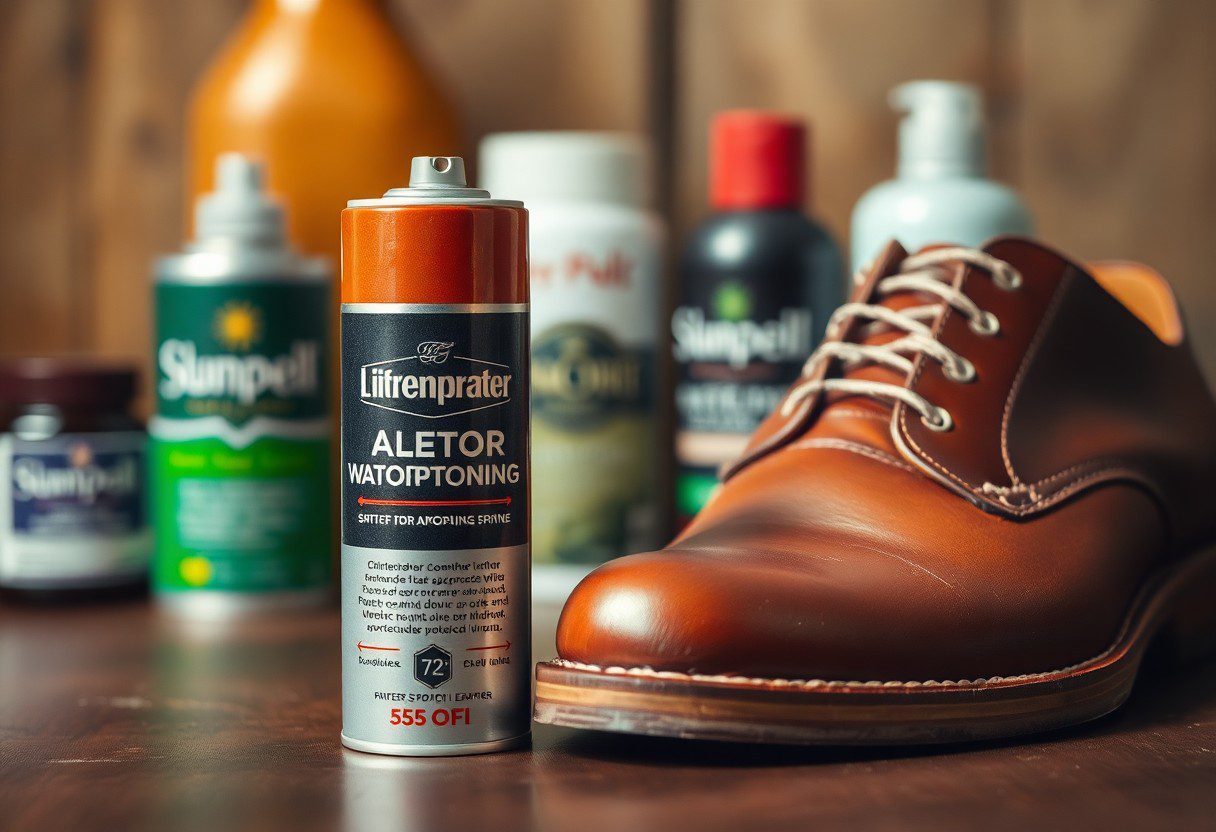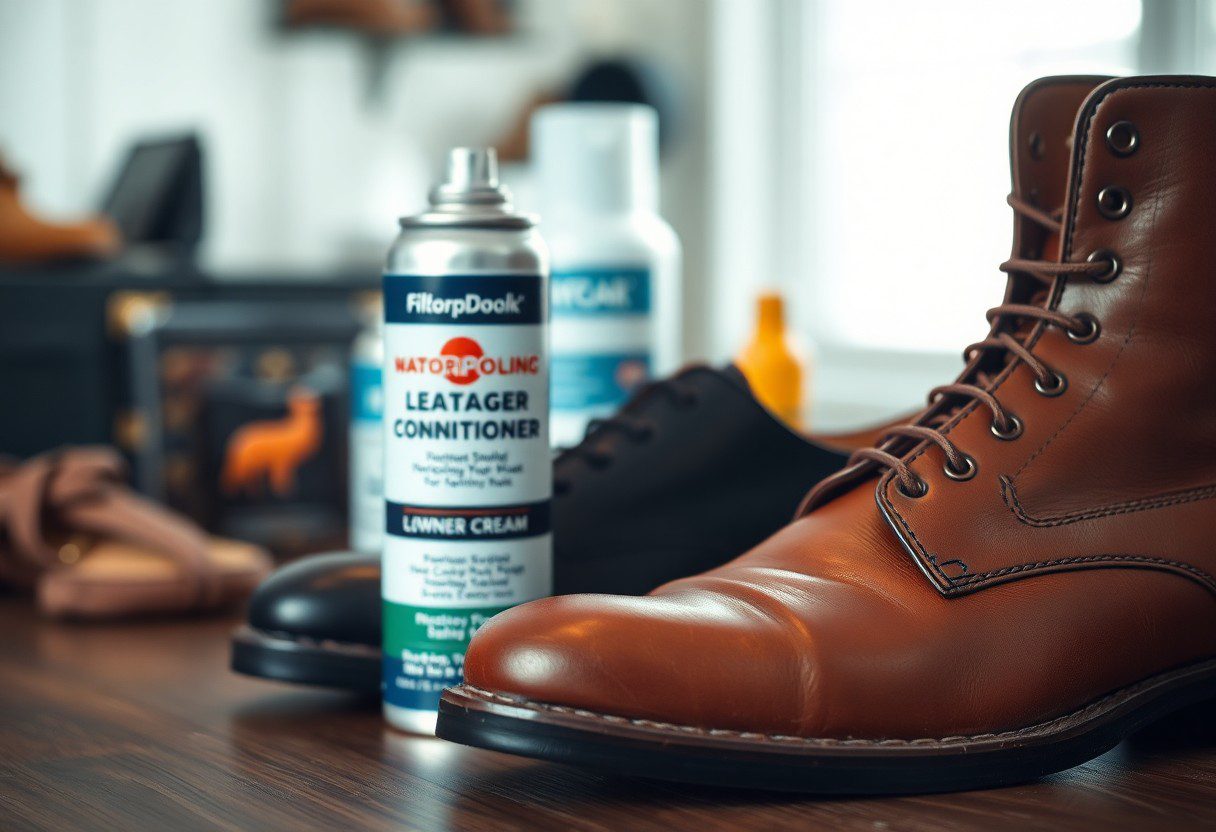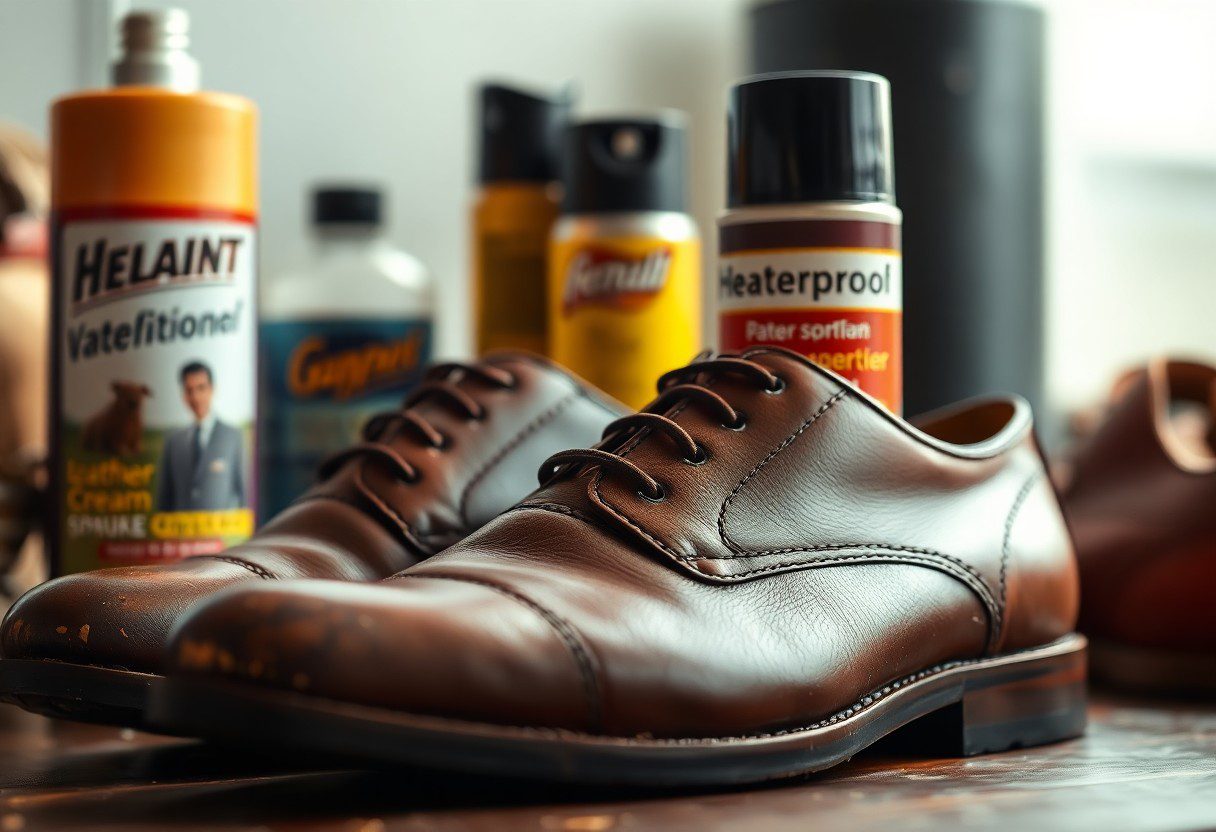Leather care mistakes can lead to irreversible damage to your cherished footwear. A common error is applying waterproofing spray to smooth leather surfaces. While these sprays may appear to provide an easy solution to protect your shoes, they can block essential nutrients from penetrating the leather, resulting in a gradual drying and cracking of the material over time. Smooth leather naturally possesses some water-resistant capabilities thanks to its grain structure, but it requires regular nourishment through shoe creams and waxes to maintain its integrity. Instead of relying on sprays, opt for premium leather conditioners and wax polishes that both protect and nourish the leather, ensuring its longevity and preserving its innate qualities.
Essential Strategies for Effective Leather Protection to Ensure Longevity
To maximize the lifespan of your leather products, it’s crucial to comprehend their protective attributes. Full grain leather boasts intrinsic water-resistant properties, attributed to its tightly woven fiber composition. However, these characteristics need ongoing and attentive maintenance to remain effective. The longevity of your leather is directly correlated to the care it receives. Utilizing waterproofing sprays can compromise the leather’s breathability, which may lead to significant damage and deterioration if not properly managed over time.
Discovering the Distinct Advantages of Full Grain Leather for Durability
After undergoing the tanning process, full grain leather retains its original surface layer, providing unparalleled natural protection. Products made from this material preserve an unblemished grain layer, offering resistance against moisture and wear. This uppermost layer is rich in natural oils and fibers that form a protective shield, making the use of additional waterproofing sprays unnecessary and potentially detrimental to the leather’s well-being.
Understanding Leather’s Moisture Regulation and Its Elegant Aging Process
Grain leather must maintain its capacity to absorb and release moisture effectively. The pores within the leather allow it to breathe and control moisture levels, keeping the material supple and preventing unsightly cracks from forming. However, the application of waterproofing sprays can seal these pores, limiting crucial airflow and disturbing the natural moisture equilibrium. As leather matures, it also requires appropriate nourishment through conditioning products. When waterproofing sprays are introduced, they create a barrier that prevents essential conditioning oils from reaching the leather, resulting in dryness and brittleness over time. Consistent application of leather cream ensures that your leather ages gracefully, developing a rich and appealing patina.

Understanding the Risks Associated with Waterproofing Spray on Leather
Many individuals mistakenly believe that waterproofing spray is the definitive solution for safeguarding their leather shoes. However, this common practice can lead to serious damage to your footwear. While these sprays offer an immediate protective shield against water, they simultaneously obstruct vital nutrients from seeping into the leather, setting the stage for potential long-term deterioration.
Clarifying Misconceptions Driven by Marketing and Misinformation
Due to aggressive marketing campaigns and well-intentioned guidance from shoe retail staff, you might be led to think that waterproofing spray is essential for all types of leather shoes. This misconception has been perpetuated by many shoe retailers, largely due to the high profit margins and frequent repurchase rates linked to these products. The reality is that regular smooth leather possesses natural protective qualities that do not necessitate the use of additional spray-based barriers for effective protection.
Evaluating Short-Term Benefits Against Long-Term Consequences
The damage inflicted on your leather shoes begins when waterproofing sprays create a barrier that prevents essential oils and conditioning agents from penetrating the leather. While you may initially experience enhanced water resistance, the reality is that your leather will gradually become dry and brittle without the vital nourishment it requires. The ramifications of applying waterproofing sprays on smooth leather extend beyond superficial protection. Your leather needs regular nourishment to sustain its flexibility and strength. When shoe creams and conditioners are unable to penetrate the leather due to the barrier created by the spray, the material risks cracking and deterioration, significantly reducing the lifespan of your shoes. Natural waxes and suitable conditioning treatments offer superior long-term protection while nurturing the leather's overall health.

Delving into the Science Behind Effective Leather Maintenance
Understanding the molecular structure of leather is a crucial aspect of effective leather care. The collagen fiber networks within your leather footwear require both protection and nourishment. The products you choose to apply can either coat these fibers or penetrate them. This interaction is essential for the long-term health of your leather shoes.
Recognizing the Importance of Regular Leather Nourishment
It is vital to acknowledge that your leather shoes require consistent nourishment to uphold their quality. The natural oils present in your leather footwear help prevent cracking and maintain flexibility. Over time, these oils diminish due to regular wear and environmental exposure. To guard the leather’s structural integrity, replenishing these oils through diligent conditioning is essential.
Understanding the Obstructive Effects of Waterproofing Sprays
A significant drawback of waterproofing sprays lies in their tendency to create a barrier. When applied to smooth leather, these sprays form an impermeable layer that prevents both water and essential nutrients from entering the material. This barrier inhibits your leather care products from effectively penetrating the surface, leading to a gradual decline in the leather’s quality over time.
The barrier effect of waterproofing sprays generates a problematic cycle for your shoes. While these sprays effectively block water, they also hinder the absorption of conditioning products that are crucial for maintaining the leather's health. Consequently, the leather may appear protected on the surface but is actually becoming dehydrated and brittle beneath. Silicone-based sprays are particularly damaging, creating a permanent barrier that is challenging to remove without harming the leather.
Implementing Effective Leather Protection Techniques for Longevity
Contrary to popular belief, your smooth leather shoes require specific care methods that align with the natural characteristics of full-grain leather. The best approach combines traditional techniques with products designed to enhance the leather’s inherent protective properties, ensuring both immediate defense and lasting durability for your footwear.
Utilizing the Benefits of Wax-Based Products for Optimal Protection
A highly effective alternative to waterproofing sprays is the use of premium wax-based solutions. These products work collaboratively with your leather’s natural grain rather than against it. Applying wax polish forms a protective layer that still allows the leather to breathe, making it particularly beneficial for toe caps and areas subject to heavy wear.
Boosting Leather Quality with Regular Cream and Conditioner Application
Unlike conventional spray treatments, leather creams and conditioners offer essential nourishment while maintaining the leather’s natural protective abilities. Your footwear benefits from oils that deeply penetrate the material, which helps to prevent drying and cracking. Additionally, consistent application of cream and conditioner creates a cumulative effect that enhances leather quality over time. The natural oils found in these products strengthen the leather’s flexibility and resilience, allowing it to develop a stunning patina. It’s advisable to apply these treatments every 4-6 wears to maintain optimal leather condition.

Identifying Appropriate Scenarios for Waterproofing Spray Application
In contrast to smooth leather, certain materials benefit significantly from waterproofing sprays. These products create an effective water-resistant barrier on specific materials that lack inherent protection. Waterproofing sprays are especially advantageous for suede, nubuck, and various textiles, where the material structure does not provide natural moisture resistance.
Enhancing Suede and Nubuck Durability with Waterproofing Spray
Treating your suede or nubuck footwear with waterproofing spray allows you to greatly improve their resistance to moisture damage. Although many modern suede materials are pre-treated with factory waterproofing, applying additional protection can help sustain this defense over time. The spray application establishes a protective barrier that effectively prevents water from penetrating these delicate materials.
Providing Optimal Water Resistance for Textile Footwear
In addition to leather alternatives, textile footwear requires tailored protection against water damage. Materials such as canvas, mesh, and synthetic fabrics can achieve enhanced water resistance through proper spray application. Most textile materials are naturally absorbent, rendering them vulnerable to water damage and staining.
Furthermore, waterproofing sprays designed for textiles assist in maintaining the shape and color of your shoes. The barrier they create also prevents dirt and debris from embedding into the fabric fibers. It is advisable to reapply the spray every 3-4 months for optimal protection, depending on the frequency of use and prevailing weather conditions.
Expert Insights and Recommendations for Optimal Leather Care
Not all leather treatments yield the same outcomes. Leather care experts strongly advise against using waterproofing sprays on smooth leather. Your full-grain leather shoes necessitate specialized care that allows them to breathe and absorb nourishing treatments. Using inappropriate products can inflict damage on the leather that could result in costly repairs.
Insights from Tannery Specialists on Leather Maintenance
To preserve the quality of leather, tannery specialists emphasize that full-grain leather inherently possesses water-resistant properties in its outer layer. To maintain these protective qualities, it is crucial to apply oils and waxes regularly. Waterproofing sprays can obstruct these essential treatments from penetrating the leather.
Guidance from Professional Cobblers on Extending Leather Lifespan
For the long-term preservation of leather, professional cobblers recommend the use of wax-based products instead of waterproofing sprays. Your shoes will flourish with treatments that protect and nourish the leather. Research indicates that 90% of premature leather damage arises from improper care products.
By adhering to appropriate leather care practices, your shoes could enjoy an impressive lifespan of 15-20 years rather than just 2-3 years with neglectful maintenance. Traditional wax treatments enable leather to retain its natural properties while providing adequate moisture protection. Your investment in high-quality leather footwear deserves meticulous care techniques that enhance both aesthetic appeal and durability.
Key Takeaways for Implementing Optimal Leather Care Practices
In conclusion, your smooth leather shoes require appropriate care that avoids waterproofing sprays altogether. Instead, choose shoe creams and waxes that nourish the leather while delivering effective water protection. Full-grain leather naturally possesses protective qualities due to its grain layer, and waterproofing sprays can obstruct essential oils from penetrating the leather, leading to drying and cracking. Reserve waterproofing sprays for suede, nubuck, or textile footwear, where they can be most beneficial. By selecting the right products, you can effectively safeguard your leather shoes and ensure their longevity.
Your Leather Care Questions Addressed
Q: Why is waterproofing spray detrimental to smooth leather shoes?
A: Waterproofing spray forms a barrier on leather that hinders essential oils and conditioners from penetrating the material. While it offers water protection, it simultaneously blocks the necessary nourishment that keeps the leather healthy, leading to dryness and potential cracking over time, ultimately shortening the lifespan of the shoes.
Q: What alternatives should I consider instead of waterproofing spray on smooth leather shoes?
A: It is advisable to use a combination of shoe cream and wax polish. Shoe cream delivers essential oils to nourish the leather, while wax polish creates a protective layer that repels water. This method works synergistically with the natural protective properties of full-grain leather, preserving the leather’s health while providing effective water resistance.
Q: Which types of footwear can I safely apply waterproofing spray to?
A: Waterproofing spray is suitable for materials like suede, nubuck, and textiles. These materials lack the natural protection found in smooth leather and thus benefit from the barrier created by waterproofing sprays. Many modern suedes and nubucks may already have factory waterproofing treatments, but additional applications can enhance and sustain this level of protection.
The Article Why you shouldn’t use waterproofing spray on regular smooth leather and better alternatives appeared first on My Shoes Finder
The Article Waterproofing Spray on Smooth Leather: Risks and Alternatives Was Found On https://limitsofstrategy.com
The Article Waterproofing Spray Risks and Alternatives for Smooth Leather First Appeared ON
: https://ad4sc.com





2 Responses
I totally resonate with your insights on leather care! I’ve always found that the right conditioning makes such a difference in the longevity of my shoes. I used to shy away from creams, thinking they’d make my footwear look shiny and unnatural. However, once I started using a good-quality leather conditioner, I was amazed at how much more supple and vibrant my shoes looked!
I completely get where you’re coming from regarding leather care. It’s interesting how conditioning can transform not just the appearance but also the feel of leather. I used to avoid creams too, mainly because I was worried about that overly shiny look—it just felt too artificial for my taste.